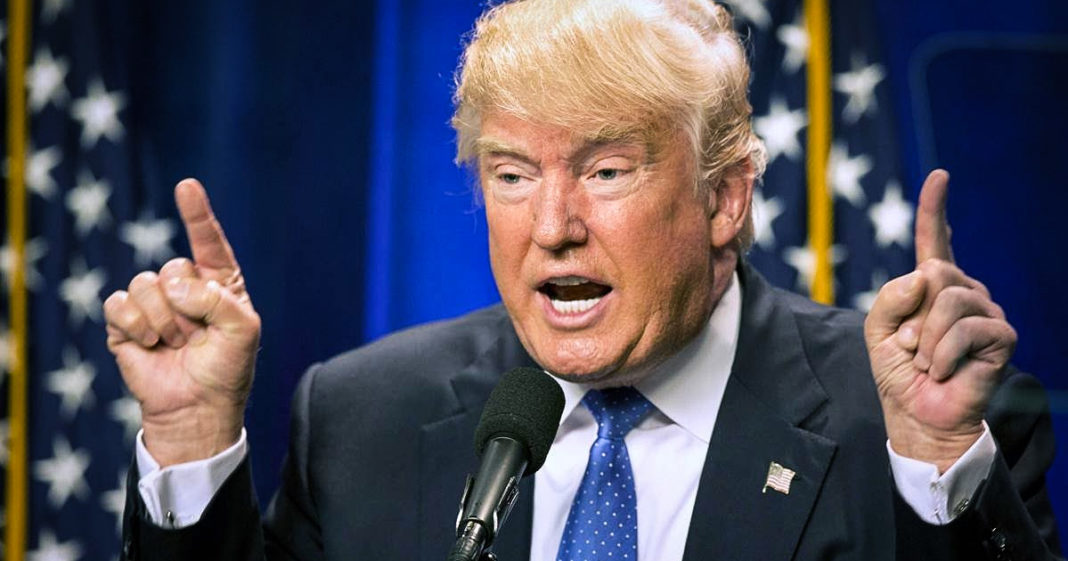It turns out that Donald Trump’s racism goes back a long ways – and he’s even had legal problems because of it. He’s also a hypocrite on the issue.
Back in 2000, Trump made his first bid for the White House, running as a member of the Reform Party. At that time, he produced a book entitled The America That We Deserve, a manifesto of his vision for the country. Among other things, Trump expressed his tolerance for diversity, including the prosecution of hate crimes. In the book, he described a society that has moved beyond “racism, discrimination against women, or discrimination against people based on sexual orientation.” According to a 2011 piece in Huffington Post, Trump provided free office space for Jesse Jackson’s Rainbow/PUSH Coalition and was host to a party during an NAACP convention. He also made a public show of his associations with African-American entertainers. In 2012, he commented that he has had a “great relationship with the blacks.”
It contradicts what Trump stands for today, and isn’t consistent with the kind of support he’s garnering. Furthermore, his record and the kind of remarks he’s made over the years suggest that Trump has always been a closet racist. In 1991, John O’Donnell, a former Trump associate, wrote an exposé entitled Trumped! The Inside Story of the Real Donald Trump. During O’Donnell’s tenure as president of the Trump Plaza Hotel, Trump told him that he hates “black guys counting my money!” He added that “the only kind of people I want counting my money are short guys that wear yarmulkes every day.” To Trump, “laziness is a trait in blacks.” Several years later, Trump didn’t bother to deny it: “The stuff O’Donnell wrote about me is probably true.”
Evidence of Trump’s racism goes back to the early 1970s, when his company came under Department of Justice scrutiny for discrimination in housing. At that time, the Trump Management Corporation owned 16,000 rental units in the New York City boroughs of Brooklyn, Staten Island and Queens. Only 700 were rented to African-American families. Trump claimed that race was not a consideration in choosing prospective tenants. Nonetheless, his company was forced to settle with the DoJ in 1975, by setting aside a certain number of units for black families. However, the DoJ came after him again in 1978 after African-American renters alleged they had been falsely told that there were no vacancies.
In 1989, Trump again stirred up race-centered controversy when he published a full-page ad in the New York Times, calling for the death penalty for five teenagers, all black or Hispanic, who had been accused of raping and beating a jogger in Central Park. According to Eugene Puryear of Justice First, Trump was “using vastly racist discourse about black thugs and criminals and being black animals and roaming the park to racialize this incident.” The five youths were convicted, but later acquitted after a sixth man confessed to the crime. Even after the acquittal, Trump was unrepentant. A recent message on Twitter asked: “What were they doing in the park, playing checkers?”
Trump’s attitudes toward President Obama are no secret. For those who may have forgotten, it was Trump who raised the question of whether or not Obama was actually born in the US, even going so far as to hire investigators to look into the matter. Recently, he implied that the Baltimore protesters were given tacit approval for their behavior because the President is an African-American.
Trump continues to stand by his recent comments, depicting Mexican immigrants as “drug smuggling rapists.” And now, he’s pandering to the most virulent racists in the country. If politicians can be judged by the supporters they draw, Donald Trump is still a bigoted racist – and not a particularly smart one.
To read about Trump’s fascination with the speeches of Hitler, which he kept by his bed, click: Trump Kept Hitler’s Speeches by his Bed: Says Only Short Jews Can Count His Money, Not Blacks.




![Senator Schumer: “Single Payer [Health Care] is On The Table”](https://sandbox.trofire.com/wp-content/uploads/2017/07/Universal-Healthcare-218x150.jpg)